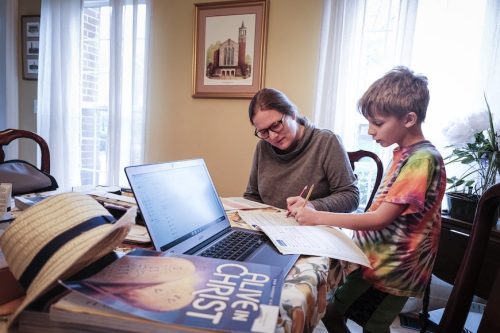By Mark Pattison | Catholic News Service
WASHINGTON (CNS) — After 20 years of writing this column, I’ve learned a few lessons about media literacy and have tried to impart them to you. Since I get one more chance, I’ll try to stress some of those lessons, and be brief about it.
— Just because it’s free doesn’t mean that it’s good. Everyone wants a piece of our pocketbook, right? Inflation has put the squeeze on us all, yes? If you don’t have to pay for something, why should you? Hey, why would you want to?
But if the service is free, then it’s you who becomes the product. We should have caught on to this decades ago before the spread of cable TV. Watching over-the-air TV doesn’t cost you anything, but TV networks and stations sell you — or at least the aggregated demographic idea of you — to advertisers. With the average half-hour TV episode now featuring under 22 minutes of content, the rest is either ads or promotions for other shows on the same network which is show … ads or promotions. Lather, rinse, repeat.
Yes, it’s galling to think we pay through the nose, with rising monthly fees no less, for cable and satellite packages that carry more ads into our homes. But the same is true for Facebook, Twitter and other social media platforms. Thanks to computer algorithms, these platforms can not only direct you to others similar to you to like or follow, but individualize the ads that you see based on your posts and preferences. You don’t have to live like a hermit. Just understand the manipulation and shoo it away.
— Minors need and deserve protection. Sure, having a kid around the house makes it easier for you to unfreeze your cellphone, but there can be a cost in that, too. Children and teens spend more and more of their waking hours online, and usage patterns boomed during the coronavirus-related lockdowns as students attended school online.

Despite their tech savvy, children do not have fully formed brains. They can be misled by an online come-on at least as easily as their parents or grandparents. It’s not only spammers and scammers, but even otherwise reputable companies that will ask kids for personal information about themselves that they never should have been asked about in the first place.
You can berate kids all you want, but it’s hardly their fault. We are all susceptible to getting sucked in. But we supposedly mature adults are supposed to know better. Not so with kids. That’s why congressional laws and federal regulations exist to protect the most vulnerable members of society.
— Net neutrality deserves to return. For the jacked-up prices we pay for internet service, providers should keep their hands off the throttle that slows down speeds for consumers. Net neutrality means simply that if the content is legal, it should be equally accessible for all.
It’s one reason the U.S. Catholic bishops have been so consistent on this principle for many years. What if some internet service provider deemed an online Mass for shut-ins as suitable for slowing down or blocking just because 1), they’re not Catholics or 2), there’s no revenue stream to exploit from it? The sooner the Federal Communication Commission can restore net neutrality rules, the better.
— If it’s not pornography, then it’s sexualization. Porn continues to be a thorn in the side of society. While it’s not exactly mainstream, no longer does one have to go to an “adult theater” to watch it since it exists in seeming abundance on pay-TV channels and online. Federal authorities probably can never do enough to stop its spread.
This is a case where net neutrality may not protect porn purveyors. Far too much porn available online was made with the consent of the participants, a great many of them minors. If it’s legal, it should be accessible, but if it’s illegal, the police can put a stop to it.
And, while we’ll never rid ourselves of inane ads, those made with serious intent that sexualize children warrant their own circle of hell. There’s never been any point in producing, selling and advertising hip-hugger jeans for 5-year-old girls.
— Broadband access is a critical part of our common future. The pandemic exposed the yawning gaps in the U.S. broadband infrastructure. There were way too many stories about kids doing their homework in the family car parked at a fast-food restaurant’s parking lot because there was a Wi-Fi signal they needed to access. Nearly as disturbing were the charges to be levied to add a home just outside a provider’s service area.
The internet, despite its many flaws, may prove to be the great equalizer and equality-giver of our day. Kids who can do homework at home, and who don’t always have to go to a library or a fast-food parking lot, do better. Want a job? You’ll have to apply online; I’ve learned that lesson myself as of late.
Help is on the way. American Rescue Plan Act money has been distributed in a fistful of multimillion-dollar grants to state to narrow those coverage gaps. But considering the profits being raked in by internet service providers, it should be their turn to put a heap of money in the pot and connect a lot more of the country. True, the United States is geographically vast, but if we can put men on the moon several times over and bring them home safely, we can do this also.
Some of these media literacy lessons appear too obvious to have been mentioned, but in our global village there are a lot of people who miss the nuance. By taking these lessons to heart, you’ll be better able to interpret what else is happening beyond the mere act of turning on the TV or computer. And you’ll be able to enjoy more why you turned on your devices, and shun the sideshow.






















